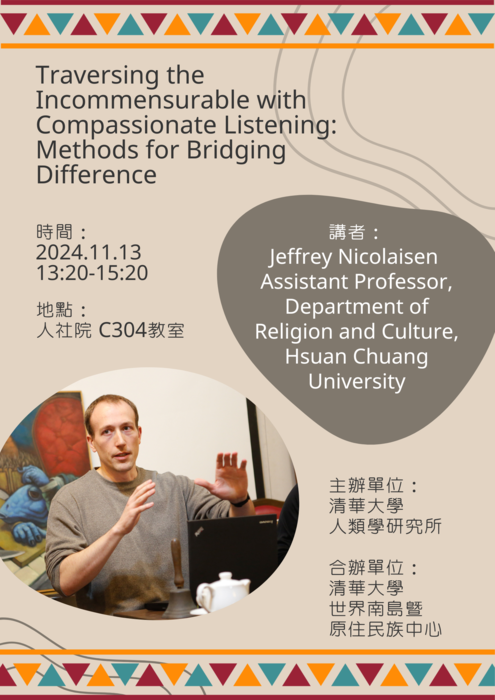Traversing the Incommensurable with Compassionate Listening: Methods for Bridging Difference

講者:Jeffrey Nicolaisen
Assistant Professor of Religion and Culture at Hsuan Chuang University
時間:11/13(三)13:20-15:20
地點:清大人社院C304
In my teaching, I have found that many students are intrigued in thinking otherwise with the tools presented by the ontological turn, learning from other “ontologies” as realities, rather than as social constructions, functional adaptations, or cultural traditions. However, when this intellectual exercise encounters students’ own lived realities, it faces challenges. As one student posed to me, how does treating other’s ontologies as real help us relate to climate change deniers when the globe is warming? In other words, when someone else’s “ontology” is directly opposed to one’s own, treating their ontology as equally real may be simultaneously destructive to one’s own ontology. Is it enough to explore the reality of other ontologies when the earth is burning? Indeed, more deeply the ontological turn involves thinking otherwise exactly to bridge incommensurability, and to find alternative futures amidst diversity, but how is that done at the interpersonal level of everyday life? Teaching a graduate seminar on religious conflict this spring presented an opportunity to test novel forms of pedagogy. I adapted the Compassionate Listening Project curriculum to address the question of how to negotiate conflict at the interpersonal level. The techniques of the Compassionate Listening Project were forged by the Quaker peace activist Gene Knudsen Hoffman, based on the teachings of the Buddhist peace activist Thich Nhat Hanh, and they have been tested and refined in decades of retreats bringing Arabs and Jews together in Israel and Palestine. As opposed to heavy intellectual theory, the training provides personal and practical techniques of habit formation designed to diffuse anger and hatred through the practice of listening compassionately to one’s perceived enemy. This humble attempt at traversing ontological incommensurability has not only helped me to bridge a pedagogical gap, but also helped me to rethink the methods of how to research conflict, how to more effectively conduct ethnographic field work, and how to improve personal relationships. In this talk, I will share my experience teaching compassionate listening and how I envision it enhancing not only research and teaching methods, but also daily interpersonal human interaction.
Assistant Professor of Religion and Culture at Hsuan Chuang University
時間:11/13(三)13:20-15:20
地點:清大人社院C304
In my teaching, I have found that many students are intrigued in thinking otherwise with the tools presented by the ontological turn, learning from other “ontologies” as realities, rather than as social constructions, functional adaptations, or cultural traditions. However, when this intellectual exercise encounters students’ own lived realities, it faces challenges. As one student posed to me, how does treating other’s ontologies as real help us relate to climate change deniers when the globe is warming? In other words, when someone else’s “ontology” is directly opposed to one’s own, treating their ontology as equally real may be simultaneously destructive to one’s own ontology. Is it enough to explore the reality of other ontologies when the earth is burning? Indeed, more deeply the ontological turn involves thinking otherwise exactly to bridge incommensurability, and to find alternative futures amidst diversity, but how is that done at the interpersonal level of everyday life? Teaching a graduate seminar on religious conflict this spring presented an opportunity to test novel forms of pedagogy. I adapted the Compassionate Listening Project curriculum to address the question of how to negotiate conflict at the interpersonal level. The techniques of the Compassionate Listening Project were forged by the Quaker peace activist Gene Knudsen Hoffman, based on the teachings of the Buddhist peace activist Thich Nhat Hanh, and they have been tested and refined in decades of retreats bringing Arabs and Jews together in Israel and Palestine. As opposed to heavy intellectual theory, the training provides personal and practical techniques of habit formation designed to diffuse anger and hatred through the practice of listening compassionately to one’s perceived enemy. This humble attempt at traversing ontological incommensurability has not only helped me to bridge a pedagogical gap, but also helped me to rethink the methods of how to research conflict, how to more effectively conduct ethnographic field work, and how to improve personal relationships. In this talk, I will share my experience teaching compassionate listening and how I envision it enhancing not only research and teaching methods, but also daily interpersonal human interaction.